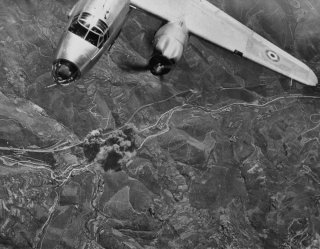The Savage Storm: The Battle for Italy 1943
James Holland's latest book chronicles the bloody campaign to liberate Italy from Nazi control.
A pause. And while they paused, Golda watched yet more Allied aircraft – bombers heading north. He and his men counted the machines. If only they had such air power, they thought. But then their mood lightened as three Luftwaffe fighter planes roared in to attack, cannons and machine guns blazing. Shouts of jubilation, then cheers as first one, then a second and third bomber fell. One trundled slowly earthwards, another fell like a stone, a mighty trail of smoke following in its wake.
An Italian farmer suddenly appeared accompanied by some German officers. Italians were still allies. The farmer was irate. More than a dozen of his chickens stolen! The officers wondered whether Golda’s men were guilty of this misdemeanour. Golda was incensed. No, his men had not stolen any chickens. What a suggestion! The rules were strict: no pilfering. A German soldier was allowed to barter for goods but not steal; commanders were authorized to shoot those who broke these rules. It didn’t mean such draconian measures were often enforced, but Golda, for one, was prepared to back his men. They were innocent. What an outrageous slur! Frustrated, the farmer and the officers moved on, continuing their search for the culprits.
Later, though, suspicious wafts of roasting chicken drifted across their hastily constructed encampment. Shortly after, one of his men offered him a portion of Hendl Haxen – a chicken drumstick – which he ate both with considerable pleasure and with little research into its origin.
A day at Cascano, and then they were ordered to their final destination for the time being: the village of Roccamonfina, nestling high along the edge of an ancient volcano crater. A serpentine climb up a dusty strada bianca and into a beautiful chestnut grove at the village’s edge. Below them was Sessa, with its ancient Roman amphitheatre, and an enchanting view to the dark Tyrrhenian Sea and the Bay of Gaeta beyond. Immediately all around them, a belt of still-dense woods of chestnuts, oaks, sycamores and olive groves, distant villages peeking through the verdant haze. Vehicles and Werfers parked up, tents erected. What a country! What a view! Golda was determined to enjoy himself: a brief chance to take things a little easy. Some bathing in that warm, inviting, sparkling sea just a few miles away, and a chance to unwind. Really, their new surroundings could hardly be more perfect.
A few days of calm, then, but it was not going to last long. This bitter war was not over, not by a long chalk, despite the turning of the Axis tide. The momentary lull was just a pause and nothing more. The clouds of war were rolling in again and Golda and his men would soon be caught up in the typhoon. So too would countless hundreds of thousands, millions, even.
Winter was coming.
One of WWII’s finest historians, James Holland is the author of Brothers in Arms, Sicily ’43, Normandy ’44, Big Week, The Rise of Germany, and The Allies Strike Back in the War in the West trilogy, and Dam Busters. He has written and presented the BAFTA-shortlisted documentaries Battle of Britain and Dam Busters for the BBC, and his WWII podcast, We Have Ways of Making You Talk, now has millions of listeners.
Image: Everett Collection / Shutterstock.com.

